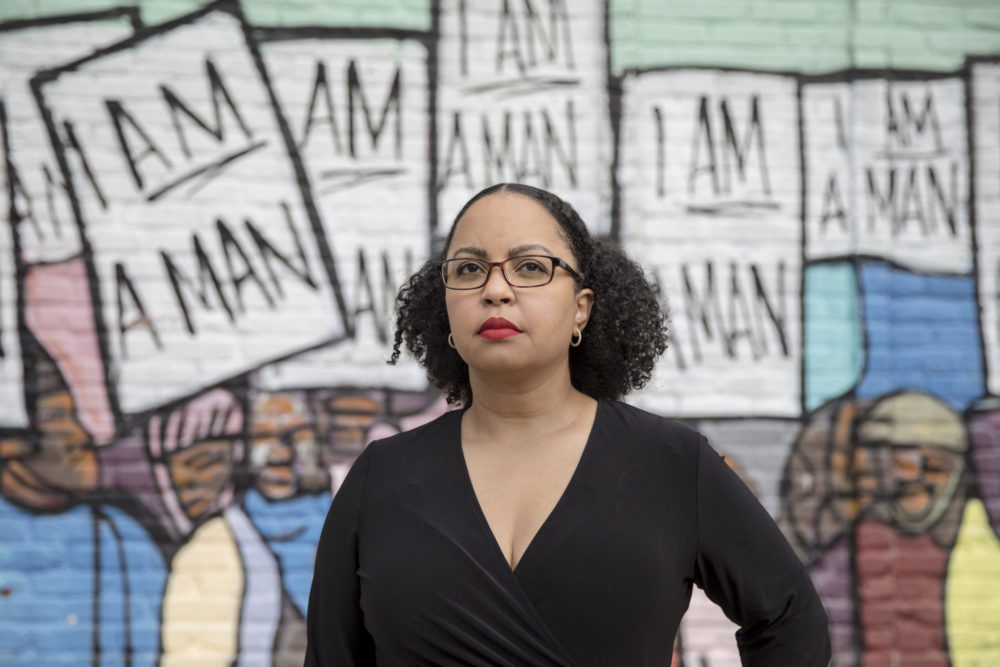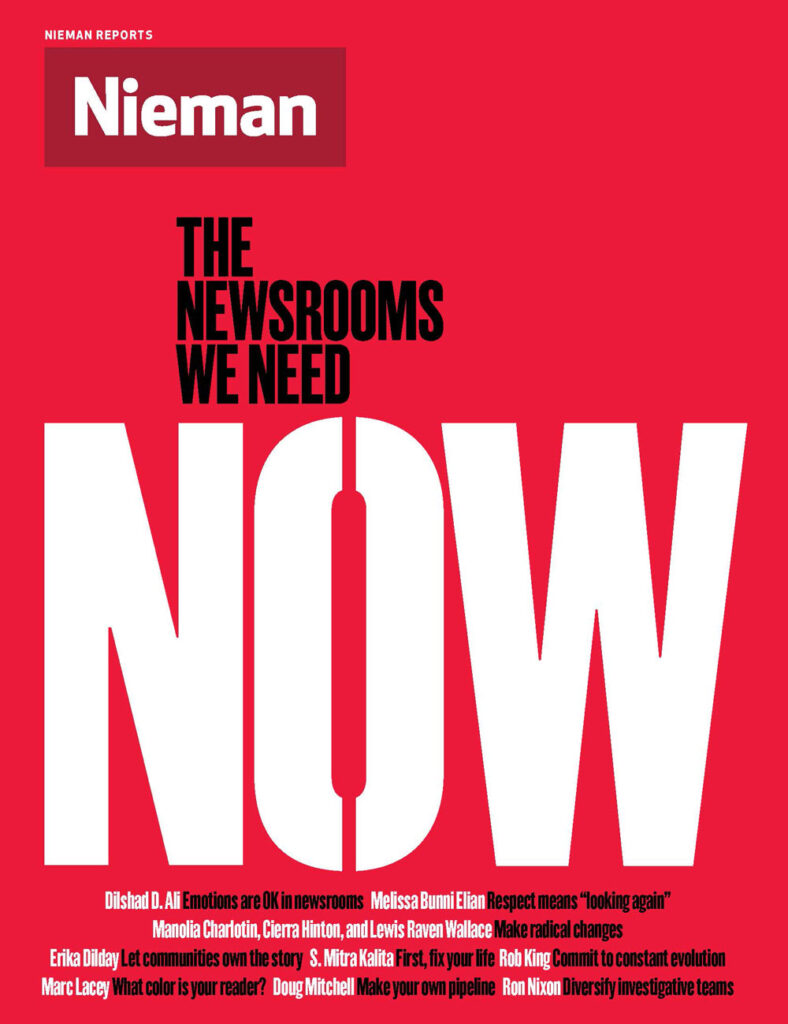Since the recent uprisings, we at Press On have been hearing and witnessing an increasing sense of urgency from journalism organizations and institutions to address their internal cultures and structures that uphold oppression and racism. This urge is excellent news, but we see the urgency as a mixed bag: Urgency is one aspect of white supremacy culture, as defined by Kenneth Jones and Tema Okun in their influential essay, “The Characteristics of White Supremacy Culture.” In this moment of reckoning, urgency can lead to makeshift solutions that often center white guilt and white needs rather than repairing harm, rebuilding trust, and centering Black, indigenous, and people of color.
We witness that urgency as organizations that have pushed out countless people of color move to bring in anti-racist trainers without first repairing the harm they have done; as organizations quickly hire people of color to fill new positions or quotas, without addressing the white-dominant internal culture; as individuals ask people of color again and again to do unpaid work to help change the industry. Black and indigenous people have been dying at the hands of police and state violence, and as the victims of pandemics, for centuries in this country. And they have been calling for change the entire time.
An awakening, as a sudden prioritization of diversity, equity, and inclusion without foundational work and structural change, risks minimizing the historical harm that has been done and producing solutions that are shortsighted. And with so many solutions in the field of journalism being borne out of the same oppressive structures, practices, and gatekeepers, this culture of urgency encourages short-term, band-aid solutions not grounded in community.
This Great Reckoning demands a transformation of the systems that got us here. The way we approach systems change is as important as the new systems we are envisioning. This calls for the kind of problem-solving that gleans from the lessons and practices of social movements.
We at Press On believe that this moment calls for radical thinking — for fundamentally reimagining the role of the journalist. By seeking a rigorous understanding of history, learning how to work collaboratively with shared trust and agency, and building collective power, journalism can rise to meet this moment in a spirit of liberation and resistance.
This rethinking is already happening in communities of color, and across the South.
When Wendi C. Thomas founded MLK50, it was clear from the outset that to carry on the legacy of those who sought justice in Memphis, she needed to prioritize journalism that would disrupt the status quo in her city. Taking inspiration directly from the cause that brought Martin Luther King, Jr. to Memphis where he was assassinated, Thomas and her team centered stories about the unjust practices that exploited workers and enforced systemic poverty.
Initially, MLK50 was envisioned as a year-long project coinciding with the 50th anniversary of MLK’s death. Being guided by the history of that specific community led to stories that held major institutions accountable and uplifted the local businesses with fair labor practices. It also informed how MLK50 would manage its team, ensuring that women and people of color got opportunities and that writers were paid fairly. MLK50 became a fixture in Memphis journalism, doing accountability reporting while also pushing for accountability from other news organizations whose coverage of communities of color has been poor.
At Press On, we support journalists in cultivating relationships with the communities they serve in order to develop shared trust and agency — and we see that shared trust not just as an outcome of good journalism or diverse voices in journalism, but as a key part of the process of reporting. In the Freedomways Reporting Project — our fellowship for Southern journalists of color — journalists report on communities in which they have deep connections, and our curriculum helps them build on those connections to develop deeply collaborative reporting processes.
This approach was instrumental for the stories Freedomways Fellow Aminata Traoré-Morris wrote about her South Georgia Gullah Geechee community. She spent months talking with people to find out the issues they were most concerned about. Traoré-Morris found that the artisans she wanted to profile were concerned about obstacles to continuing their craft. Land development was limiting their access to natural materials. Local laws against street selling were criminalizing their businesses.
At the same time, she heard from Gullah Geechee families in Liberty County, Georgia, where she lives, that kids aren’t learning about their heritage in school. That led Traoré-Morris to write an article for a local magazine, Liberty Life, about ways to incorporate Gullah Geechee culture and history into the curriculum. In the process, she engaged with teachers and administrators who are now taking those ideas into consideration.
Shared trust leads to shared agency, which leads to community-driven action. The relationships she forged with members of the local school district led Traoré-Morris to organize the First Annual Lowcountry Culture and Literacy Forum in rural Liberty County. This had a lasting impact on how Gullah Geechee history and culture is taught in local schools. Her journalism was an act of community-building.
In addition to grounding ourselves in history and developing shared trust and shared agency, journalists can help build collective power as a means to building better news systems. Over at News Voices: North Carolina, a program of Free Press, Press On board chair Alicia Bell is leading efforts to use community organizing methods to reshape local media ecosystems across the state. After a series of workshops and dream salons between community members and local journalists in eastern North Carolina, residents started a newsletter to fill the information gap. And, as Bell often points out, the lack of resources local residents experience in terms of local news and information are connected to broader systemic inequity and racism. We hear a lot about disinvestment in news, about news deserts — but Bell says we can’t address the problems of revenue for news in low-income areas without addressing income inequality itself. Journalists and journalism benefit from more equitable power structures, which means saving journalism actually requires us to invest in collective power.
When we call for more vision and imagination in journalism, we honor Black traditions of radical imagination — traditions that don’t call only for imagination about the future, but that require us to imagine a different present. People imagined, in fact, they knew, that a life beyond enslavement was possible. People imagined, knew, embodied life outside of legalized Jim Crow segregation. And right now, here, we must imagine, know, create our way out of the multiple disasters we are facing. Journalists have a role to play, not by imagining what is true or factual, but by imagining a new way of being as storytellers right now.
If imagination is using stored images to create new ideas, radical imagination is to uproot the images and systems we are given in order to create new ideas — thus a tool and a practice for decentering white-dominant culture. We can imagine and create liberatory media now. In doing so, we can draw on the movement journalism traditions of Ida B. Wells, Marvel Cooke, Claudia Jones, John Mitchell Jr., and many others who fought slavery, exploitation, and segregation through their words. Radical imagination demands that we value process as much as outcomes, understanding that focusing on outcomes often results in leaving the most targeted and oppressed folks out.
Finally, we must demand more from ourselves and our work. We need to harness the urgency of the Great Reckoning with intention, not settling for diversity committees and revised hiring policies at a time when we need ground-up, revolutionary change. Our intervention must get to the roots of the problems, not just their symptoms. As our colleague Mia Henry often says, journalists are always using our power either to oppress, or to liberate. How are you using your power in this moment?
Cierra Hinton, Lewis Raven Wallace, and Manolia Charlotin are co-directors of Press On.
The Newsrooms We Need Now
As American society—and American newsrooms—grapple with an unprecedented time in the country’s racial justice movement, Nieman Reports is publishing a series of essays about how journalism should respond to the challenges of the moment, from accelerating journalists of color moving into senior decision-making roles to improving coverage of racism and white supremacy.




